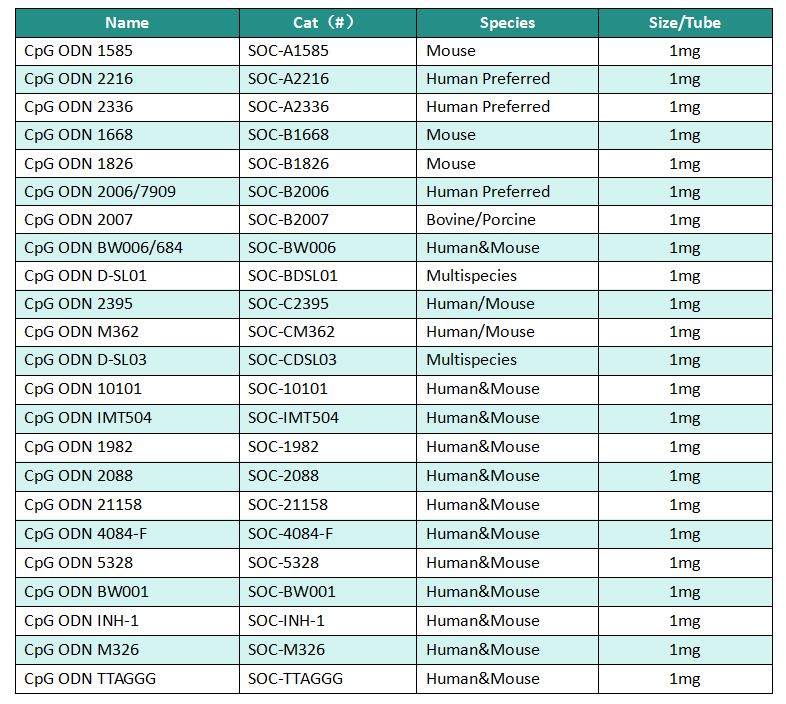CpG ODNs (CpG oligodeoxynucleotides) serve as immune adjuvants and are widely used in various experiments, including immunology, vaccine development, cancer therapy, and anti-infection treatments.
Vaccine Development and Enhancement
CpG ODNs can stimulate mammalian immune cells and induce a Th1 immune response, thereby enhancing the effectiveness of vaccines. During vaccine development, CpG ODNs can be added as an adjuvant to improve the immunogenicity and protective efficacy of the vaccine. Studies have shown that CpG ODNs of types A, B, and C significantly promote the production of specific antibodies, predominantly IgG2a, which stimulates the Th1 immune response. This provides an experimental foundation for the development of new drugs for the prevention and treatment of viral infectious diseases.
Cancer Therapy Research
In melanoma treatment research, blocking programmed cell death protein 1 (PD-1) has proven effective. A novel in situ sprayable fibrin gel has been developed that contains CpG ODN-modified ovalbumin (OVA) antigens expressed on small extracellular vesicles (DC-sEVs) derived from dendritic cells (DCs) and anti-PD-1 (aPD-1). CpG ODNs can activate dendritic cells by stimulating tumor-infiltrating dendritic cells (TIDCs) and dendritic cells in tumor-draining lymph nodes (TDLNs), promoting their maturation and activation. These dendritic cells then provide effective immune stimulation. Results indicate that the dual activation with CpG ODNs in an incomplete tumor resection model extended mouse survival and reduced recurrence rates, offering a promising method for preventing recurrence and metastasis of B16-F10-OVA melanoma.
Anti-Infection Therapy Research
CpG ODNs also possess anti-infection properties, as they can activate immune cells and enhance the body's ability to resist infections. In anti-infection treatment experiments, CpG ODNs are injected into experimental animals to observe their effects against specific pathogens. One study showed that the combination of CpG ODNs (types A and B) in three doses (0.1, 1, and 10 μg CRAB-1) significantly enhanced the immune response of “Eriocheir sinensis” (Chinese mitten crab) and its ability to resist “Aeromonas hydrophila”. This suggests that CpG ODNs may be a potential new immunostimulant for controlling diseases in crabs.
Immunological Mechanism Studies
By injecting experimental animals with CpG ODNs, researchers can observe their effects on immune cell differentiation, proliferation, activation, and cytokine secretion, thereby gaining deeper insights into the regulatory mechanisms and functions of the immune system.
In summary, CpG ODNs, as immune adjuvants, have significant applications in a wide range of experiments. These studies not only contribute to the development of vaccines, cancer therapies, and anti-infection treatments but also help deepen our understanding of the regulation and function of the immune system.
Synbio Technologies | CpG ODNs
Synbio Technologies provides standard CpG ODNs with purity>95% and endotoxin levels<5EU/mg, ensuring excellent batch-to-batch consistency. We also offer custom synthesis services for CpG ODNs, available in quantities ranging from milligrams to grams, with a variety of specifications to choose.

Standard CpG ODNs Products
 DNA Synthesis
DNA Synthesis Vector Selection
Vector Selection Molecular Biology
Molecular Biology Oligo Synthesis
Oligo Synthesis RNA Synthesis
RNA Synthesis Variant Libraries
Variant Libraries Genome KO Library
Genome KO Library Oligo Pools
Oligo Pools Virus Packaging
Virus Packaging Gene Editing
Gene Editing Protein Expression
Protein Expression Antibody Services
Antibody Services Peptide Services
Peptide Services DNA Data Storage
DNA Data Storage Standard Oligo
Standard Oligo Standard Genome KO Libraries
Standard Genome KO Libraries Standard Genome Editing Plasmid
Standard Genome Editing Plasmid ProXpress
ProXpress Protein Products
Protein Products
























